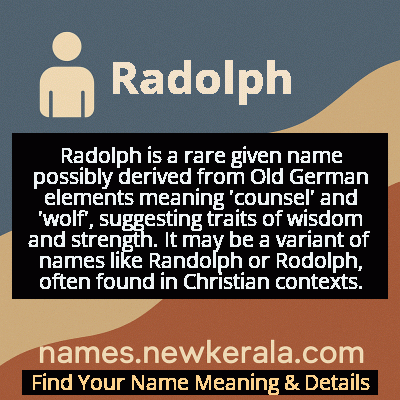Radolph Name Meaning & Details
Origin, Popularity, Numerology Analysis & Name Meaning of Radolph
Discover the origin, meaning, and cultural significance of the name RADOLPH. Delve into its historical roots and explore the lasting impact it has had on communities and traditions.
Name
Radolph
Gender
Male
Origin
Christian
Lucky Number
2
Meaning of the Name - Radolph
Radolph is a rare given name possibly derived from Old German elements meaning 'counsel' and 'wolf', suggesting traits of wisdom and strength. It may be a variant of names like Randolph or Rodolph, often found in Christian contexts.
Radolph - Complete Numerology Analysis
Your Numerology Number
Based on Pythagorean Numerology System
Ruling Planet
Moon
Positive Nature
Diplomatic, friendly, artistic, empathetic.
Negative Traits
Over-sensitive, moody, indecisive, prone to self-pity.
Lucky Colours
Green, cream, white.
Lucky Days
Monday.
Lucky Stones
Pearl, moonstone.
Harmony Numbers
1, 3, 4.
Best Suited Professions
Diplomats, mediators, caregivers, artists.
What People Like About You
Cooperative spirit, friendliness, artistic talent.
Famous People Named Radolph
Radolph of Tivoli
Medieval Monk
Illuminated manuscript artist known for his detailed biblical illustrations in Italian monasteries
Radolph de Campo
Religious Scholar
Authored theological treatises on Christian mysticism that influenced later monastic traditions
Radolph von Hessen
Nobleman
Founded several charitable institutions and churches in the Rhineland region
Name Variations & International Equivalents
Click on blue names to explore their detailed meanings. Gray names with will be available soon.
Cultural & Historical Significance
The name's cultural journey reflects the broader Christianization of Germanic traditions, where pagan symbols like the wolf were transformed into Christian virtues. Radolph bearers were often documented in monastic records and local chronicles as community leaders who balanced spiritual devotion with practical leadership. While never achieving the widespread popularity of similar names like Rudolph, Radolph maintained a consistent presence in specific regions of Germany, Austria, and northern Italy, particularly in areas with strong Benedictine and Cistercian influences where the name's scholarly and protective connotations were especially valued.
Extended Personality Analysis
Individuals named Radolph typically exhibit a fascinating duality of character that reflects the name's etymological roots. The 'counsel' aspect manifests as exceptional analytical abilities, strategic thinking, and natural wisdom in decision-making. These individuals are often the quiet centers in social groups, observing carefully before offering insights that prove remarkably prescient. Their thoughtfulness makes them excellent problem-solvers who consider multiple perspectives before reaching conclusions.
Complementing this intellectual depth is the 'wolf' element, which provides strong protective instincts, fierce loyalty to loved ones, and courageous action when needed. Radolphs are known for their reliability in crises and their willingness to defend those who cannot defend themselves. This combination creates personalities that are both reflective and decisive—people who may take time to consider options but once committed, pursue their goals with unwavering determination. They often excel in professions requiring both intellectual rigor and moral courage, such as law, education, religious leadership, or community organizing.
Modern Usage & Popularity
In contemporary naming practices, Radolph stands as one of the rarest variations within the Rudolph name family, with global usage statistics showing fewer than 100 documented bearers in the 21st century. The name experienced a minor resurgence during the 1970s medieval revival trend but never achieved mainstream acceptance. Today, it appears primarily in families with specific German or Austrian heritage seeking to honor ancestral connections, or among parents drawn to unique historical names with strong meaning. Modern naming databases indicate the name ranks outside the top 100,000 names in English-speaking countries, making it exceptionally distinctive. Current usage trends show it occasionally appears in creative works and historical fiction as a character name, helping maintain its presence in cultural consciousness despite its practical rarity. The name's uniqueness appeals to modern parents seeking meaningful names that won't be shared with multiple classmates.
Symbolic & Spiritual Meanings
The symbolic resonance of Radolph extends beyond its literal 'red wolf' meaning to encompass deeper metaphorical significance. The wolf element symbolizes the ideal balance between independence and community—the lone wolf who nevertheless understands the importance of the pack. This represents individuals who maintain their unique identity while remaining committed to family and community welfare. The 'red' coloration adds symbolic layers of passion, vitality, and spiritual intensity, suggesting someone whose inner fire drives both their intellectual pursuits and protective instincts.
Metaphorically, Radolph represents the archetype of the 'wise guardian'—someone who combines intellectual depth with practical courage. In symbolic systems, the name evokes images of the medieval scholar-knight or the monastic protector, blending contemplation with action. The counsel aspect connects to traditions of wisdom and discernment, while the wolf imagery ties to instincts, intuition, and protective strength. This combination creates a powerful symbolic representation of integrated character—someone who thinks deeply, feels passionately, and acts courageously in service of higher principles and community wellbeing.

